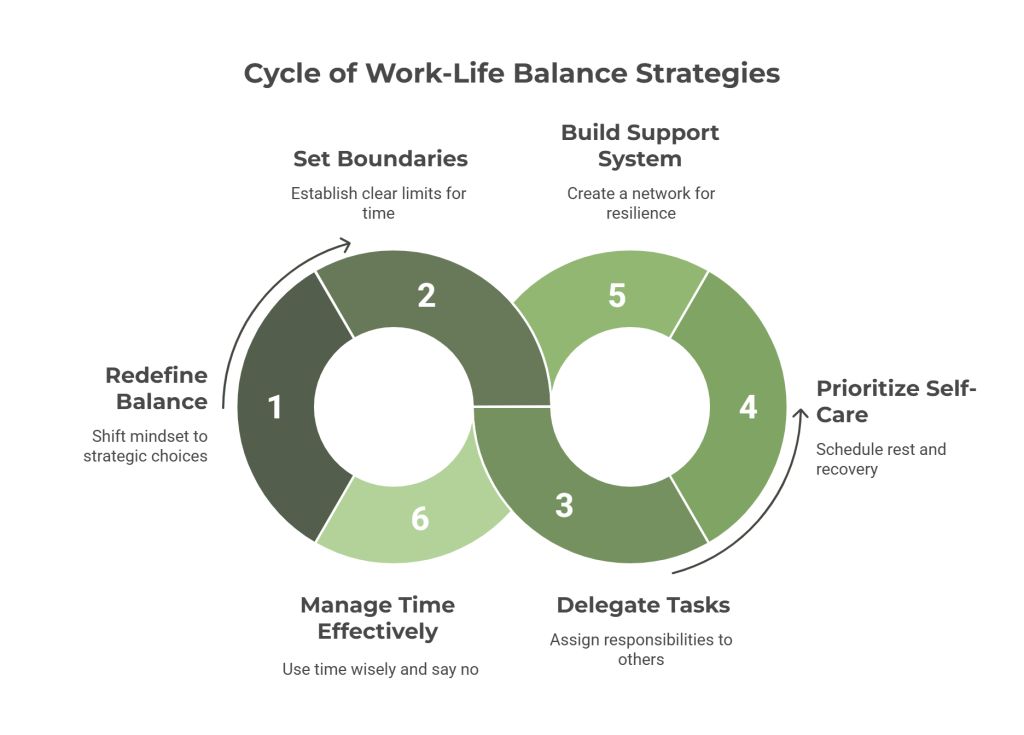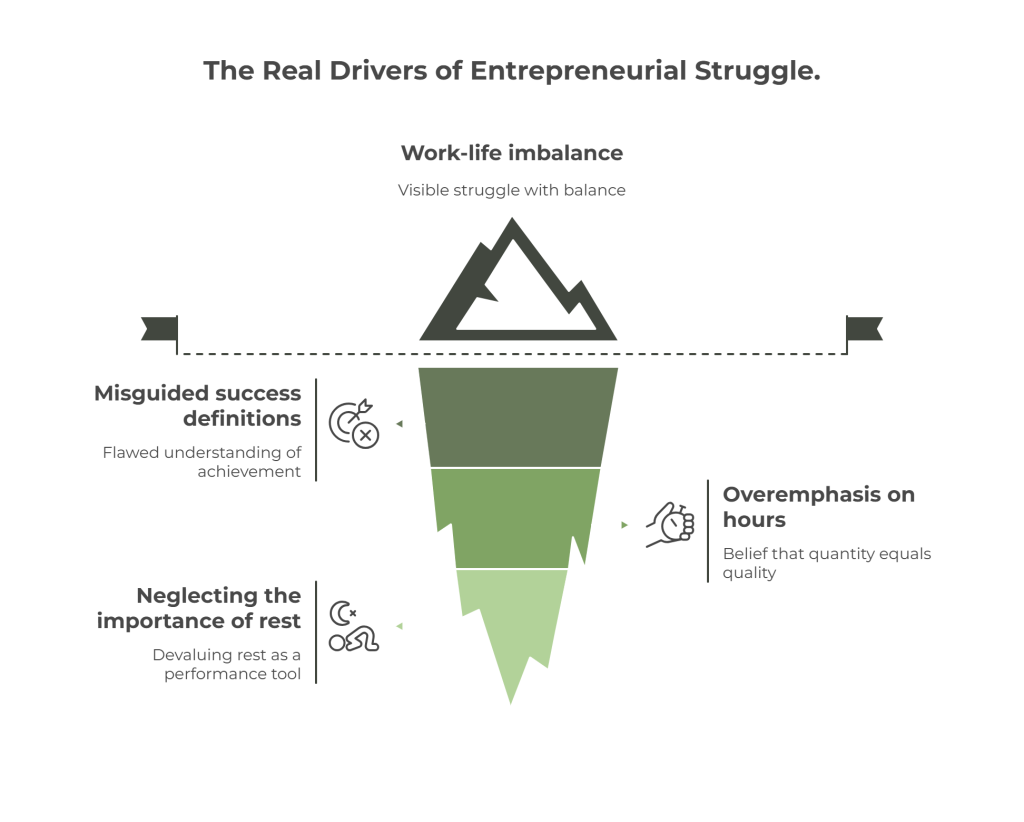Can an entrepreneur have work-life balance?
The hustle is glorified. But the cost? Often hidden.
If you’re building a business, you’ve already learned this the hard way. The long nights. The blurred weekends. The pressure to be everywhere at once.
Work-life balance feels like a luxury, or worse — a weakness.
But here’s the truth: You don’t scale a business by burning yourself out. You scale it by building a system — and a mindset — that allows you to sustain high performance over time.
Can entrepreneurs have work-life balance?
Yes — but not by chasing symmetry.
It requires strategy, intentionality, and a willingness to redefine what success looks like across the whole of your life, not just your income statement.
The reality of work-life balance for entrepreneurs
1. The entrepreneurial path is unpredictable.
Running your own business doesn’t come with clear office hours or clean handoffs. You’re not just the founder — you’re the operator, strategist and decision-maker.
And with that comes a high cognitive load:
- Constant context-switching.
- Endless decision points.
- Pressure to show up, even when you’re running on empty.
The line between work and life doesn’t blur — it vanishes.
This isn’t about poor time management. It’s the default setting of most entrepreneurial environments.
2. Flexibility cuts both ways.
Yes, entrepreneurship gives you freedom. Freedom to set your own hours. To choose when and how you work. But that same flexibility often becomes a trap. You can always work. So you often do.
Instead of creating space, you fill every gap. Weekends become workdays. The result? You’re physically present at dinner but mentally still in that 3 p.m. investor call.
Many entrepreneurs find themselves in an “always-on” cycle. These Work-Life Balance Trends for Entrepreneurs explores how modern founders are rethinking flexibility in light of remote work, tech overload, and shifting priorities.
The gift of flexibility only pays off when you pair it with boundaries — not just in your calendar, but in your identity as a leader.
3. Balance isn’t about symmetry. It’s about rhythm.
Let’s be clear: You won’t always be in balance. And that’s okay.
There will be times when the business demands more from you. Product launches, pivots, team transitions — they pull your focus hard.
But those moments can’t become your norm. Balance, for entrepreneurs, is about finding harmony over time, not splitting your day 50/50.
And that starts by understanding:
You don’t need to work less.
You need to work aligned — with your energy, your values, and your long-term goals.
Sign up for more articles like this. 1 email/month, no fluff.
[sibwp_form id=2]
Key strategies for achieving work-life balance

Here are six strategies that move you from reactive hustle to intentional leadership.
1. Redefine balance
The first mindset shift? Let go of the myth of perfection.
Balance isn’t about achieving a flawless daily routine or perfectly organised calendars. It’s about making strategic choices aligned with what matters most.
Start by defining your non-negotiables — the things that protect your energy and values:
- Family dinners.
- Morning workouts.
- One tech-free evening per week.
These aren’t luxuries. They’re anchors. And when protected, they become the structure that holds your rhythm.
For more on shifting from perfection to intentional prioritization, check out this guide: Outsourcery: The Balancing Act – An Entrepreneur’s Guide to Work-Life Harmony.
2. Set boundaries
Without clear boundaries, your calendar becomes a free-for-all. Meetings overflow. Personal time disappears. Urgency takes over everything.
Fix this by using tools you already trust in business:
- Time-blocking for deep work and rest.
- Office hours for team access.
- Communication windows for client interactions.
Then, articulate these boundaries — clearly and confidently.
“I don’t take calls after 6 p.m.”
“I’m offline Fridays — that’s strategy and recovery time.”
Boundaries aren’t walls — they’re frameworks that help you show up at your best. Explore Forbes: 18 Ways Entrepreneurs Can Maintain Work-Life Balance for real-world tips from entrepreneurs navigating similar situations.
3. Delegate, outsource, and automate
Entrepreneurs often default to “if I want it done right, I’ll do it myself.” But that’s not leadership — that’s bottlenecking.
Start by asking:
What am I doing out of habit… not necessity?
Delegate what your team can handle. Outsource what doesn’t need your brain. Automate what’s repeatable.
Read: Entrepreneur: 10 Strategies for Achieving Work-Life Balance for practical tips on what and how to delegate effectively.
4. Prioritize self-care and rest
Rest isn’t passive — it’s performance fuel. Your ability to make high-quality decisions, stay emotionally regulated, and lead with presence all depend on recovery.
Schedule it.
- Walks between meetings.
- Non-negotiable sleep routines.
- Space to unplug without guilt.
Your best ideas don’t come from burnout. They come from breathing room.
5. Build a support system
You don’t need to do this alone — and you shouldn’t.
Strong support systems can include:
- A coach or mentor who calls out your blind spots.
- A partner who holds you accountable to rest.
- A peer group of other founders navigating the same terrain.
Support isn’t a sign of weakness. It’s infrastructure for resilience.
6. Practice effective time management
You don’t need more time. You need more clarity on how you’re using it.
Try:
- Time blocking (schedule focus, not just tasks).
- Smart to-do systems (limit daily priorities to 3–5).
- Digital boundaries (email hours, app limits).
And above all — learn to say no.
Protecting your time is protecting your energy.
Influencing factors
The way you approach balance isn’t just about strategy — it’s shaped by context.
Here are three critical layers to consider:
1. Personal factors
Your stage of life, family responsibilities, and personality traits all influence how you experience balance.
- Entrepreneurs with young children or caregiving roles may need tighter systems and stronger boundaries.
- High-resilience personalities may overestimate their capacity, delaying rest until it’s too late.
- Age and life phase shift how you define success — and what you’re willing to sacrifice for it.
Balance isn’t one-size-fits-all. It must adapt to your reality.
2. Business factors
The stage and structure of your business matter.
- Early-stage founders often face 12-hour days and high volatility — balance here might mean carving out micro-recoveries, not long weekends.
- A mature team and scalable systems? That creates space to truly step back.
Industry plays a role too: Service-based businesses often come with more client-facing pressure. Product businesses may offer more control over time.
Know your terrain — and design your rhythm accordingly.
3. Psychological factors
This is the invisible layer — but it runs deep.
- Burnout isn’t just physical — it’s mental depletion from overextending your attention.
- Time perception gets skewed when urgency becomes your norm.
- Self-efficacy — your belief in your ability to manage your time and energy — drives how you make trade-offs.
Entrepreneurs who invest in emotional regulation, mindset work, and self-awareness build stronger foundations for balance — even under pressure.
For research-driven insights, see the academic paper: Work-Life Balance in Entrepreneurs – IJPREMS Study.
Myths to unlearn

Most entrepreneurs don’t struggle with work-life balance because they lack discipline. They struggle because they’ve been sold the wrong definitions of success.
Here are three myths it’s time to retire:
Myth 1: Balance = laziness or lack of drive
Let’s be honest — in some circles, “balance” gets treated like a dirty word.
But needing rest doesn’t mean you lack grit. Wanting time with your family doesn’t mean you’re not committed.
Balance isn’t about doing less. It’s about doing what matters most — with focus, energy, and presence.
If anything, balance demands more discipline — not less.
Myth 2: More hours = more success
You’ve been told that the more you work, the more you win.
But high performers know: more hours don’t equal better output. In fact, after a certain point, more time equals poorer decisions and slower execution.
The entrepreneurs who scale sustainably are the ones who optimize, not overextend.
Myth 3: Rest is for after you’ve “made it”
You don’t earn rest by hitting a revenue target. You earn it by being human.
Waiting to rest until you “arrive” is how entrepreneurs burn out at the top. The truth? Rest is a tool — for clarity, decision-making, emotional regulation, and creativity.
If you only rest after the fact, you’re constantly recovering from damage rather than protecting your performance.
Rest now — so you don’t have to recover later.
Real Talk: What balance actually looks like
Here’s what no one tells you: Balance isn’t static. It’s not something you achieve once and then coast on forever.
It evolves — based on your season of life, your business cycle, your energy, and your goals.
There will be trade-offs.
- Some quarters will be heavy on strategy and team building.
- Others may require deeper presence at home or personal recovery.
Balance doesn’t mean everything gets equal weight at all times. It means you’re making conscious choices — not reactive ones.
It means designing your week in alignment with what matters. Not defaulting to urgency or guilt.
True balance is built through rhythm, clarity, and recalibration.
And when that becomes your normal —You don’t just feel better. You lead better.
Conclusion
Work-life balance isn’t about playing small. It’s about playing the long game.
You didn’t build your business to become a prisoner to it. You built it to create freedom, fulfillment, and meaningful impact — in and outside of work.
Yes, balance is possible. But only when it’s intentional.
Work-life balance isn’t a reward for success. It’s a requirement for it.
Now’s the moment to challenge the model you’ve been operating in. Redesign your systems. Refine your standards. Build a business that supports the life you actually want to live.
FAQ on work-life balance for entrepreneurs
How many hours should an entrepreneur work?
There’s no magic number — but more hours rarely mean better outcomes. What matters is intentionality, not volume.
Some weeks may require a sprint, but consistently overworking leads to diminishing returns. Prioritising high-leverage activities and building rest into your workflow will protect your decision-making capacity over time.
Learn how to focus on what truly matters in our Leadership Identity Program, built for high-performing entrepreneurs ready to operate at a more strategic level.
Do successful people really have work-life balance?
Yes — but not in the way most imagine.
Balance isn’t a 50/50 split. It’s a strategic alignment between your personal values and business goals.
Many successful entrepreneurs integrate work and life instead of trying to separate them. That means setting clear boundaries, staying connected to your goals, and prioritizing health as a non-negotiable.
How do famous entrepreneurs manage work-life balance?
They don’t do it alone.
Most high-performing founders have support systems: executive coaches, strong leadership teams, and personal routines that protect time and focus.
Think: intentional delegation, strict calendars, and non-negotiable rest.
Curious what this could look like for you? Here’s how we help high performers reduce burnout and realign their time.
Are all entrepreneurs workaholics?
No — but many start that way.
The startup grind often conditions entrepreneurs to over-identify with their output. But sustainable leadership requires learning when to push and when to pause. Being available 24/7 isn’t a badge of honour — it’s a fast track to burnout.
What’s the first step to better work-life balance as an entrepreneur?
It starts with clarity — on what matters most, and what needs to shift.
Audit your current energy output. Notice what drains vs. what drives. Then, implement one boundary, delegate one task, or schedule one non-negotiable recovery block.




